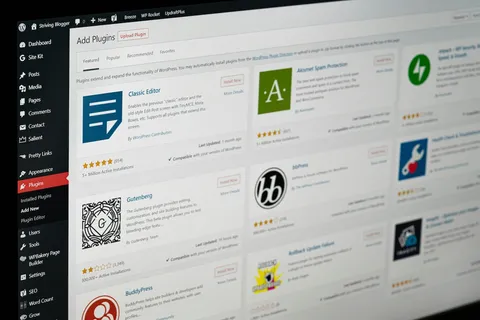
- 10 Mar, 2025
- Insights
- By Steve Marks
5 Essential Tips for Building a Successful Small Business Website
Building a website for your small business is an exciting step, but with so many options and decisions to make, it can feel overwhelming. A well-designed and strategically planned website can help you attract customers, establish credibility, and grow your brand. To help you get started, here are five essential tips to ensure your website is set up for success from day one.
1. Choosing the Right Domain Name
Your domain name is your digital address, so it needs to be memorable, easy to spell, and relevant to your business. Ideally, keep it short, avoid hyphens and numbers, and choose a trusted extension like .com or .co.uk. A well-chosen domain name helps with branding and searchability, making it easier for potential customers to find you online.
How to Choose the Perfect Domain:
Keep it simple and easy to remember. Avoid long or complicated words.
Stick to well-known extensions (.com, .co.uk, .net) for credibility.
Avoid special characters and numbers that can confuse users.
If your ideal domain name is taken, consider adding your industry or location (e.g., “SmithsBakeryLondon”).
I can set up a domain for you with a £25 admin fee, or you can register your own through services like Namecheap.
2. Investing in Quality Hosting
Web hosting is the foundation of your website. A reliable hosting provider ensures your website loads quickly, remains secure, and stays online without frequent crashes or downtime. Poor hosting can lead to slow loading speeds, security vulnerabilities, and an overall bad experience for visitors.
What to Look for in a Good Web Host:
Speed: A fast-loading website improves user experience and SEO rankings.
Security: Look for SSL certificates, regular backups, and protection against cyber threats.
Support: Reliable 24/7 customer service is essential in case of technical issues.
Scalability: As your business grows, your hosting should be able to handle more traffic.
I offer hosting and support solutions tailored for the size of your business, including email accounts and storage. Click here to find out more.
3. Crafting Engaging Content
Your website isn’t just about looking good—it needs to communicate clearly and provide value to visitors. Quality content is crucial for engaging customers, improving SEO, and showcasing your expertise.
Focus on Solving Customer Problems
One of the biggest mistakes small business owners make is focusing too much on their backstory rather than addressing their customers’ needs. Your content should revolve around the problems you solve and the benefits you provide, rather than just the history of your business.
Key Pages Your Website Needs:
Homepage: Clearly state who you are, what you do, and how customers can contact you.
About Page: Instead of just your backstory, explain why your business exists and how it benefits customers.
Service/Product Pages: Detail what you offer with compelling descriptions and clear calls to action.
Blog Section: Regularly updated blogs help improve search rankings and provide useful information to customers.
Contact Page: Make it easy for customers to reach you with a contact form, phone number, and email address.
Planning Your Content with a Sitemap
Before you start writing, create a sitemap or content map outlining the pages you need and how they will connect. This helps ensure a logical flow and makes the user experience seamless.
“Building a website doesn’t have to be complicated. By focusing on these five key areas, you’ll create a strong online presence that attracts customers and grows your business. If you need help with domains, hosting, design, or content, feel free to get in touch. I’d love to help you build a website that works for your business!”


4. Branding & Design Essentials
A strong brand identity helps build trust and recognition. Your website’s design should reflect your brand’s personality through colours, fonts, and consistent visuals.
Design Tips for a Professional Look:
Consistent Colours & Fonts: Stick to a colour scheme that matches your branding. Use no more than 2-3 complementary fonts.
High-Quality Images: Blurry or pixelated images make your site look unprofessional. Invest in professional photography or use high-quality stock images. I partner with local photographers or ensure high quality stock photos are used on all of my website builds.
User-Friendly Navigation: Ensure visitors can easily find what they’re looking for with a clear menu structure.
Mobile Responsiveness: More than 50% of web traffic comes from mobile devices, so your site must look great on all screen sizes.
I can help with branding, or you can use tools like Canva to maintain consistency across your site and marketing materials.
5. SEO & Mobile Optimisation
A great website isn’t just about looks—it needs to perform well on search engines and mobile devices. Mobile-friendly design is crucial since most users browse on their phones. SEO basics, like keyword-rich content and proper meta descriptions, help your site get found on Google.
SEO Best Practices:
Use relevant keywords naturally in your content.
Write clear, descriptive meta titles and descriptions.
Optimize images to improve loading speed.
Get backlinks from reputable sites to improve credibility.
Regularly update your content to keep it fresh and relevant.
If you need an SEO audit, I can help optimise your site to improve rankings and visibility.
Ready to Get Started?
Building a website doesn’t have to be complicated. By focusing on these five key areas, you’ll create a strong online presence that attracts customers and grows your business. If you need help with domains, hosting, design, or content, feel free to get in touch. I’d love to help you build a website that works for your business!



